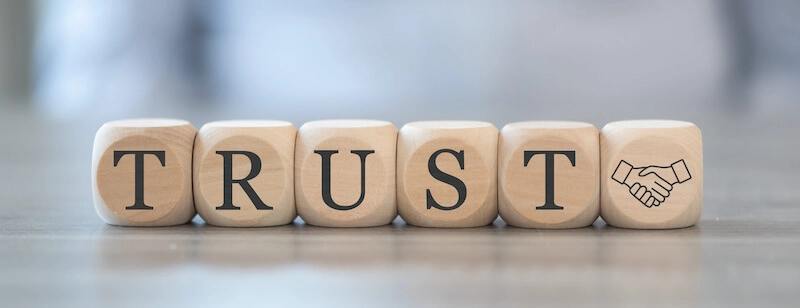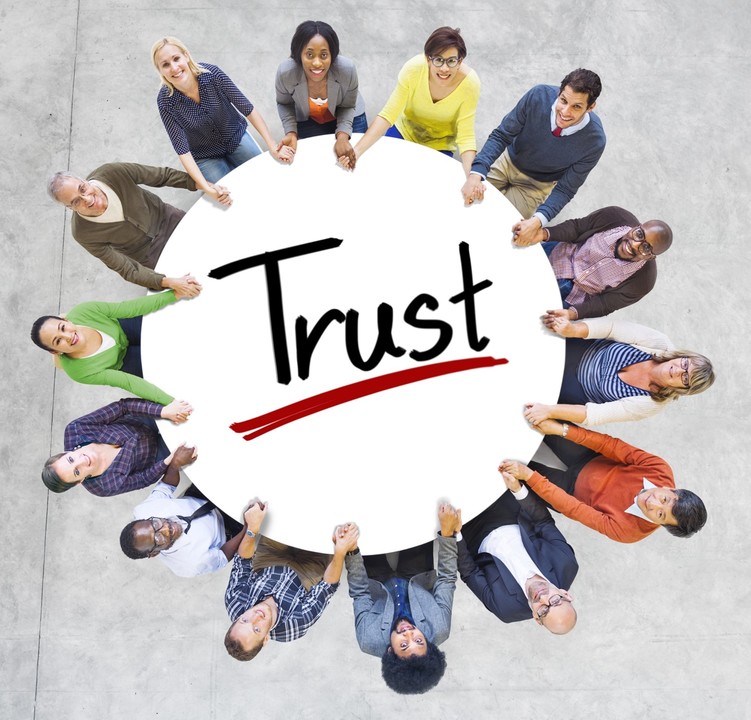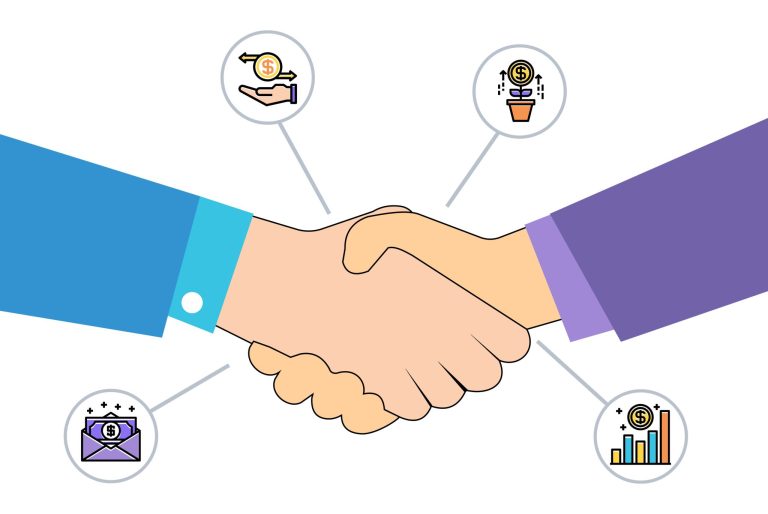How to build trust

What is trust?
Trust is an essential element in any successful working relationship.
It involves a sense of assurance that the other person will act in a way that is consistent with shared values and expectations. Trust is built over time and can be broken down quickly if expectations are not met.
In order to build trust, it’s important to demonstrate honesty, openness, and reliability.
Types of trust that you need to know
When we talk about building trust, there are actually two distinct types of trust that you should know about.
These types of trust are developed in different ways. Both are important and work together synergistically. So it’s critical that you simultaneously develop both types of trust.
The two types are practical trust and emotional trust.
1.Practical trust
Practical trust in a work environment is the belief that someone something will do what they say they will do In other words, this type of trust is based on results and outcomes. It’s built through positive experiences, such as when someone on their promises, meets deadlines and produces quality work.
In order to build practical trust, you need to be clear about expectations and ensure that you meet them. You also need to deliver results in a timely manner and accept responsibility for any mistakes or missteps.
2.Emotional trust
This type of trust is based on feelings of safety and security with the other person. It’s built through positive interactions and experiences, such as when someone is open, honest and responsive to your needs.
In order to build emotional trust, you have to be authentic and genuine, listen and respond supportively. You also need to be consistent, reliable, and trustworthy in order for the other person to feel safe in the relationship.
Why building trust is crucial in any relationship

Trust is a key factor in any relationship. This is especially true in the workplace, where trust needs to be established between colleagues and between managers and their teams.
Trusting relationships are essential for collaboration, effective communication, and overall success.
Trust leads to better performance as employees feel more secure in taking risks, which leads to better results.
The foundation of trust also lays the groundwork for stronger relationships, improved morale, and greater collaboration.
Ultimately, building trust is an essential skill for any successful employee or leader.
It’s a key factor in creating a positive work culture and driving success within an organization.
By putting effort into developing trust with your colleagues and team, you can create an environment of collaboration and support that will lead to greater success in the workplace.
Most effective ways to build trust

Building and maintaining trust is essential for strong and effective working relationships. Here are some of the most effective ways to build trust in any working relationship:
1. Value long-term relationships
Valuing long-term relationships is essential in building trust. When we value the relationships we have with colleagues, it allows us to build strong and lasting connections that are based on mutual respect and understanding.
One of the most important things to remember when valuing long-term relationships is that trust takes time to develop. It isn’t something that can be built overnight, so take the time to nurture your relationships.
2. Be honest
Honesty is the cornerstone of any trusting relationship. In order to build and maintain trust, it’s essential that we demonstrate honesty and transparency in our interactions with others.
Honesty involves telling the truth, not only about facts but also about feelings and opinions. It also involves being open to honest feedback from others and being willing to admit when we’ve made a mistake.
3. Honor your commitments
Honoring your commitments is an important part of building trust in any relationship, especially when it comes to the. In order to honor your commitments, you need to be clear about expectations and make sure that you meet them. This means being consistent in delivering results on time and taking responsibility.
4. Admit when you’re wrong
Admitting when you are wrong can be difficult, especially in a professional setting. However, it is an important step in building trust with your colleagues and team that will lead to greater success in the workplace.
The first step in admitting when you are wrong is to recognize and accept that you have made a mistake. This may be difficult, but by acknowledging it and taking responsibility for it, you can demonstrate honesty and humility that will foster trust in your relationships.
5. Communicate effectively
Communicating effectively is an essential part of building trust in any working relationship. Effective communication involves being clear and concise while expressing your thoughts, feelings, and ideas. It also involves listening actively and engaging in meaningful dialogue with others.
When it comes to communicating effectively, it’s important to be mindful of the words you choose and the tone you use.
By following these steps, you can build trust in your working relationships and create a collaborative and supportive work environment that will drive success for both yourself and your organization. With practice, you will be able to create trusting relationships that are essential for collaboration, effective communication, and overall success.
6. Be vulnerable
Being vulnerable at work can be a challenge, but it is an essential part of building trust in any relationship. It is important to remember that vulnerability is not a weakness, but rather a strength. Being vulnerable doesn’t mean you are giving away your power; it means allowing yourself to be seen and heard in a genuine way.
7. Be helpful
Being helpful is an important part of building trust in any working relationship. It’s about being proactive and taking the initiative to offer the assistance needed.
Being helpful involves offering resources, advice, and support without the expectation of anything in return.
One way to be helpful is to take the time to listen to your colleagues and understand their needs. This will show them that you care and want to be a part of the team in a meaningful way, which will help to build trust and foster collaboration.
By following these steps, you can learn how to build trust at work and create strong relationships with your colleagues and team. With dedication and practice, you’ll be able to create an environment of collaboration and support that will lead to greater success for everyone.
8. Show people that you care
Showing people that you care is an essential part of building trust in any relationship. It can be as simple as offering a smile or kind word to making a conscious effort to listen and understand someone’s point of view.
One way to show people that you care is to express genuine interest in them and their lives. This could be as simple as asking questions about their hobbies or interests and taking the time to learn more about them.
By showing people that you care, you demonstrate your willingness to invest in them and create a trusting relationship. This will help foster collaboration and mutual respect, which leads to better results for everyone.
9. Stand up for what’s right
Standing up for what is right is a crucial part of building trust in any working relationship. It’s about being honest and taking a stand when something isn’t right, even if it means standing alone or going against the grain.
When you stand up for what is right, you demonstrate your integrity and commitment to doing what is right; this builds confidence and trust in you.
10. Be transparent
Being transparent is an important part of building trust in any working relationship. Transparency is about being open and honest and communicating the truth even when it isn’t necessarily convenient or easy. It also involves being clear, direct, and sincere in your communication to ensure that everyone has the same understanding of the facts.
Transparency is essential for creating trust and collaboration, as it allows everyone to have a clear understanding of the situation and work together effectively.
Building strong relationships by building rapport
Oftentimes, the first step to building trust is building rapport.

What is rapport?
Rapport is a relationship of trust and understanding between two or more people.
It is an essential part of building trust in any working relationship and can be achieved by getting to know each other on an emotional level.
This involves having conversations about shared interests, values, and goals, as well as practicing active and engaged listening.
Rapport is also built through gestures of kindness, such as offering compliments and support.
By taking the time to build rapport with your colleagues, you will be able to establish a sense of trust and mutual respect that can lead to greater collaboration. This in turn can help create a culture of success for everyone on your team.
How to build rapport
1.Make a good first impression
Making a good first impression is essential for building trust in any working relationship. It involves demonstrating your professionalism, reliability, and competence to those around you.
To make a positive first impression, start by being well-groomed and dressed appropriately for the occasion.
For example, if you’re meeting with a client, it’s important to look professional and put your best foot forward.
Additionally, you can make a positive first impression by being warm and friendly yet still maintain a level of professionalism.
Try making small talk about topics both parties find interesting or exchanging stories about shared experiences.
2.Listen actively
Listening actively is an important skill to foster trust in any working relationship. This involves listening to and understanding the thoughts, feelings, and perspectives of others without judgment or assumptions.
The first step in active listening is to focus on the conversation. Make sure that you are fully present and not distracted by anything else. This will also help you remember the important details and follow up on topics discussed.
Try to paraphrase what the other person is saying in order to confirm that you understood correctly. This will demonstrate your level of attention and commitment to fostering trust.
3.Ask engaging questions
Asking engaging questions is an important part of building trust in any working relationship. Questions should be tailored to the person and situation, as well as being open-ended, non-judgmental, and reflective.
The key to asking engaging questions is to focus on authenticity and inquiry. This means avoiding questions that are overly personal or probing and instead focusing on understanding the person’s perspective.
4.Be aware of your body language
Body language can be a powerful tool for building trust in any working relationship. Being aware of your body language and how it communicates to others is essential for fostering an environment of understanding and collaboration.
By paying attention to your posture, facial expressions, and gestures, you can create a sense of trust with those around you. For instance, making eye contact and smiling can demonstrate your level of interest and respect for the other person.
By keeping your arms open and avoiding crossed arms or hands on hips, you are showing that you are approachable and willing to listen.
Being mindful of how much physical space you take up in a room can help create a sense of openness and inclusion.
5.Find common ground
Finding common ground is a key factor in building trust.
The common ground gives people something they can connect over and helps foster an environment of understanding and mutual respect.
For example, finding shared interests or values can be a great way to break the ice and start building rapport. Sharing stories about similar experiences or talking about topics you both find interesting can help strengthen the bond between you.
6.Empathy and respect
Showing empathy means being able to understand and appreciate the feelings, experiences, and perspectives of others.
It involves being able to put yourself in someone else’s shoes and to view the situation from their point of view.
Respect is about treating others with kindness and courtesy, regardless of their opinions or beliefs. Respect also means being honest and open in your communication, valuing the input of others, and honoring agreements.
These qualities demonstrate that you can be trusted to uphold ethical standards and keep confidential information safe.
How to build trust with customers

Building trust with customers is essential for creating successful and long-term relationships. Customers want to feel like they are valued and that their needs are being heard. By taking the time to understand what customers need and creating genuine, meaningful connections, businesses can make sure customers feel comfortable interacting with them.
One way to build trust with customers is to focus on quality customer service. Making sure that customers are satisfied with their experience and addressing problems quickly is a great way to demonstrate trustworthiness.
Another way to build trust is to use social media as an avenue for communication. Platforms like Facebook, Twitter, or LinkedIn can be used to answer individual queries and provide useful information about products and services.
Finally, businesses should take the time to cultivate meaningful relationships with customers. This can be done by establishing a rapport through regular contact or taking the time to get to know customers on a more personal level. This helps create an environment of trust and loyalty between customers and businesses.
How to build trust with clients
Building trust with clients is essential for developing successful relationships and delivering quality services or products.
To start, it is important to create an environment of understanding and respect by being open, honest, and authentic in your interactions.
Practicing active listening is one of the best ways to demonstrate a genuine interest in clients’ needs. This means asking questions, summarizing what has been said, and in a way that shows you understand their point of view.
In addition to active listening, it is important to show empathy and respect towards clients. This involves being aware of how your words and actions can affect them and taking the time to get to know more about their individual needs and goals.
Being reliable and delivering on promises are key elements of building trust with clients.
Making sure that projects are finished on time and meeting deadlines shows that you can be trusted to uphold commitments.
Building trust and credibility in business as a leader

Implemented strategies to build trust and credibility in my business as a leader by demonstrating integrity, displaying ethical behavior, and fostering an environment of understanding and mutual respect. Utilized active listening techniques to gain a better understanding of client/customer needs, showed empathy and respect towards others, delivered on promises, and maintained regular contact with clients to cultivate meaningful relationships.
Building trust doesn’t happen overnight
Remember, trust is a two-way street, so it’s important to extend the same level of trust and respect that you expect from others. With patience, practice and dedication, you can learn how to build trust at work and create strong, successful relationships. Good luck!








